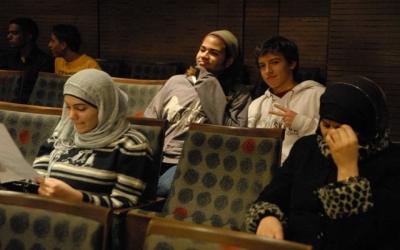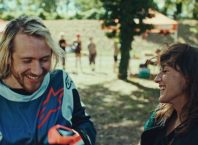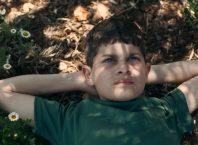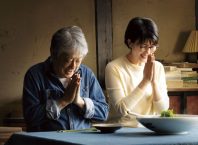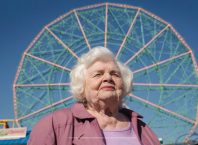“This is our little effort, trying to make a change in this place,” said Gilli Mendel, manager of the Jerusalem Cinematheque’s Education Department at the screening of “I AM YOU ARE: Films and Identity” that took place as part of the Jerusalem Film Festival. The six movies shown were a selection from the past two years of films created by teenagers participating in filmmaking workshops at the cinematheque. Mendel introduced the films, saying, “I believe all of us have to invest very little to make this a better place.” She said that former participants in the program have told her that the workshop was a “turning point in the way they saw their life in the region” and noted that one of the films participating in this year’s festival shorts, “Les Sabreen?” was made by one of the program’s first graduates, Muayad Mousa Alayan.
Initiated by Mendel and developed jointly with producer Dror Shwartz, the month-long workshops for Arab and Jewish youth have been offered since 1999. In the past two years an additional workshop was held in Łodz, Poland for Polish and Israeli youth and one in the Israeli Negev led by Yuval Ben Yehuda (who has worked with the program for the past nine years) for Bedouin and Jewish youth from the area. Working in groups they write their own scripts, film and edit the movies, with professional guidance, support and the use of advanced equipment. The results are intensely personal films, striking in the honesty and courage with which they confront emotional, political and spiritual dilemmas.
The first film followed a young man named Yam (Hebrew for ‘sea’) as he initiated contact with the abusive father he had not seen or spoken to for ten years. After the film, Shwartz addressed the audience: “Six teens worked on this film – two Arab, four Jewish. They don’t necessarily deal with issues of coexistence in the films. Through the process of working on a joint project, trying to make the best film possible, they choose to work together and support one another.” The topics of the films shown were varied – from an encounter with an Arab rap group in East Jerusalem, to a Bedouin girl’s experience applying for a job at MacDonald’s, the stories were an opportunity to see the personal world of these teenagers through their own eyes.
During the discussion that followed the screening, Shwartz said that about thirty participants are accepted each year from hundreds who apply to the program. In the early years the Arab girls were often accompanied by chaperones, he views it as a sign of the success of the program and the relationships and trust that have been established, that this is no longer deemed necessary. “The workshop is not defined as a workshop in coexistence,” said Shwartz, “we come to make movies. Through the work itself, the team effort, you have to cooperate. We aim to give them a meaningful experience in accepting others, in accepting differences. There is a magic to it – there is no substitute for this kind of intensive work experience.”
The film festival is over, but this year’s workshop, which began Monday, July 20th, is already in progress, creating the films of the future.

